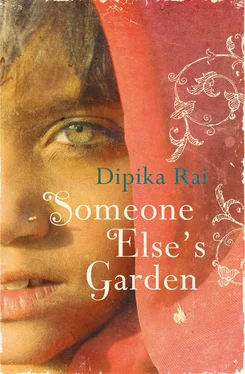The first thing Asmara Didi did after the stroke was get rid of the squatting toilets. They were replaced with Parryware commodes. Grey and ageing, the commodes now support a brown ring just at the top edge. The flush has never been used. The rusty chain hangs down from the ceiling like a noose. There are always buckets of water sitting in the bathroom to be poured into the cistern. Singh Sahib leaves a hanky hanging on the door handle if there is some big business in the toilet, otherwise, he pours a mug of water in himself to dilute the colour to a respectable, barely noticeable yellow. He is still uncomfortable on the Bakelite seat, and if he could have stood without support, he might have squatted on it. But he can’t, so he sits, properly, legs falling off the edge, cringing every time his skin touches the cold hard surface. Bibiji, in the cities everyone is using these filthy things. Can you imagine? I have to trust Asmara to clean the seat for me. You are the lucky one, dying once . . . I may be alive, but I do not live . . . I die a little every day . . .
‘Brooding isn’t good for you.’ She comes on silent feet. She shakes her head to herself. She can smell it in the room, that air of resignation. She tries to shun her thoughts physically by shrugging her shoulders, but they stay wrapped round her like a warm shawl. She wipes her upper lip and with a smile faces the man waiting for death. Still smiling, she lights the candles and ignores the tear.
He is tempted to tell her to go lose herself in the kitchen, but he doesn’t. ‘Lokend will be back tomorrow. Will you see him?’ she asks.
The big man says nothing, he looks at his feet with great intent. What can he say? Yes, he would love to see his son, nothing would make him happier, but there is so much history in their desperate destinies. How does one wash away history? He is in that gully of silence between mountains of anticipated rejection. To climb up one of those mountains he would have to give up his crushingly heavy fear. He might have been able to release his burden to Bibiji for safekeeping, but he has nowhere to put it now. The gully is a safe place. Help me. Please help me, he asks of the dead.
It is the living that replies, ‘Good, I’ll tell him then. I’ll make something nice for your lunch. Lokend loves puris.’ Asmara Didi chuckles. ‘Does he love them, or does his mongoose? What’s its name again? Raja?’
Today it’s just the same. The memory of holding a mongoose pup rushes over the old man unbidden. He feels the tears once again creep up under his skin, thick and strong.
‘Go,’ he says with desperation to the woman.
There isn’t just sadness in his tears, there is also anger.
But as they fall, they become tears of regret.
Lokend jumps into the jeep. ‘Let’s go,’ he says to the mongoose, ‘let’s go find those bandits.’ He starts the engine. The jeep jumps into life, Ram Singh has left it in gear again. The sudden jump jogs Lokend’s thoughts. ‘Better not, my friend. I better take the truck. My brother is all spruced up for the wedding. He’ll kill me if I take the jeep and he has to ride in the truck.’ He chuckles.
Lokend started talking to Raja a long time ago. All through his lonely youth, he knew he was different from his brother who deserved and received his father’s vague attention. If he was someone else he might have been jealous. But he has no time for jealousy, or for that matter sadness. If there is one regret in his life, it is that his mother died before him. He would have liked to have known her.
Chapter 3
WHAT CAN SHE DO ABOUT HER BIRTHMARK? Her mother has suggested a little turmeric mixed with flour. When her father became indebted to the Big House, Ram Singh magnanimously invited him to consult with the widow Asmara Didi. She had silently begged her father to take her to the Big House and get a cure for her birthmark then, but he did not. Why? Acceptance, that’s why. Her father had accepted the birthmark on his daughter’s forehead as finally as he accepted the weather or the bandits.
The dew hasn’t formally evaporated off the mustard leaves outside. Except for the sleeping baby, she is alone at home. Her mother gave her this much. As an excuse Lata Bai left Shanti behind for Mamta to look after. She has an hour before her mother will return from the well.
Mamta runs her hand over her wedding sari. For a minute she considers why it is already lying unwrapped, in precise folds gleaming like a treasure in her mother’s tin trunk, then she remembers her mother had used the wrapping to deliver Shanti. She picks up a corner and looks through the sheerness of the fabric. Everything turns red, the red of love. Mamta smiles. It is as it should be. ‘Keep my world red, oh Devi,’ she prays. ‘Jai ho Devi, Devi jai ho,’ she recites her mother’s words. Almost a married woman, she feels she has an equal right to them. The baby stirs in her cot. ‘Shanti, hey, Shanti. I am to be married. I hope Amma will be proud of me,’ she says with a laugh, and then quickly makes a face and adds, ‘and I hope Bapu will be pleased with me for the first and only time in his life.’ Shanti gurgles. ‘You should be happy, your turn will come. I will pray you get many suitors and that each one is more handsome and richer than the next!’ Shanti gurgles again.
Mamta interprets her baby sister’s sounds: ‘Will mine be a handsome hero?’ She cannot afford to indulge in self-doubt. By Gopalpur standards she is already an old woman, her younger sister was married before her. She looked after all her brothers and sisters and she’s still at home. Without the borrowed money, no one would have taken her. What kind of man accepts a woman, almost in her twenties, with a birthmark? It has to be a desperate man. ‘Of course he will be a handsome hero. Do you think Amma could have picked anyone else for me?’
‘He’ll come on a horse and then we’ll ride away together . . .’ I’ll make sure to cover my birthmark with my pallav. She takes the sari over to the baby. ‘Have you ever seen anything this beautiful?’ She rubs it against Shanti’s skin. The rough ersatz silk makes the baby cry.
Mamta scoops up the baby and starts rocking her, automatically. ‘Yes, we will be in love forever like Singh Sahib and Bibiji. What a love that was! Then, when I have my own baby, I will come home and you two can play together.’
She bends her head over Shanti protectively. The baby sees the red birthmark approach. It is a comforting red, it is this patch of red that has cared for her since her birth. The patch of red and her mother’s wiggly nipple, that’s what Shanti knows of love.
Mamta regards her sister carefully, dressed in one of her old converted blouses, now no more than a cartography of spilt meals. She outlines each stain with her finger as she sings.
‘He’ll come on a horse to get me, He’ll come on a horse to get me, He’ll bring me a new sari to wear, He’ll bring me flowers for my hair . . .’
She sings into the baby’s ear. It is the song that the boys from across the river use to taunt her. Delivered by Ramu, the words, sung to the same tune, are much harsher. But singing it to Shanti, she takes the bitterness out of it, much as she does with the wild cucumbers, rubbing one cut end against the other to bring out the poison, as foamy as a madman’s spit.
‘You are not married yet, get back in the field.’ Her father has returned earlier than usual.
Mamta drops Shanti in her swing, and rushes out, forgetting to give it one push before she leaves. The abandoned baby starts to cry. But it has learned not to cry long; no one will come.
Mohit and Sneha are beating the dust out of the reed mats. Prem had hung them up in the Babul tree before he left for the Big House in the early-morning dark. He’d stopped Mamta from helping him: ‘Your hands are already shredded,’ he’d said, ‘save them to massage oil into your husband’s hair.’ For an instant she feels the tips of her fingers on a strange skull of black hair, soft and light, and a timorous shyness envelops her like diaphanous silk.
Читать дальше












